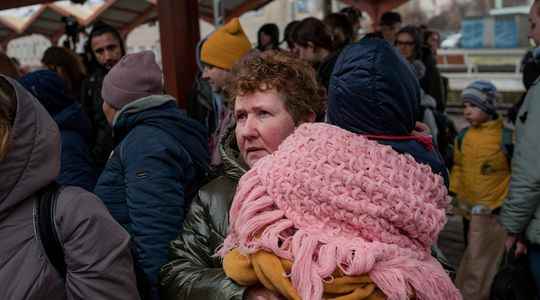“Deportation”. The word no longer belongs only to history books, it now appears in the main lines of the news. He burst into the amphitheater of the United Nations Security Council on Tuesday, April 5, through the voice of the Ukrainian president. Invited to speak before the international regulatory body on the aftermath of the war which began in Ukraine at the end of February, Volodymyr Zelensky denounced the “colonization” undertaken by Russia, then raised the issue of the displacement of Ukrainians to the neighboring territory.
“Russia has already deported tens of thousands of our citizens to their country. Later? It will be hundreds of thousands,” he said before continuing: “They have already kidnapped more than 2,000 children. Russia wants to make Ukrainians silent slaves”. As when he had urged Europe to deliver weapons to his country to defend itself or when he had qualified his Russian counterpart as a “war criminal”, the former comedian in the series servant of the people did not mask his grievances.
Repeated accusations
The attack is frontal. She is not the first of a Ukrainian leader. About ten days ago, several voices, official or civil, pointed to “forced displacements” of inhabitants of Mariupol. On encrypted Telegram messaging, the mayor of the city, Vadym Boychenko, also mentioned “the confiscation of Ukrainian passports”. Bombed and besieged by the Russian army, the port city in the south-east of the country has seen all attempts to establish a humanitarian corridor fail. Isolated, the inhabitants have to deal with hunger and lack of electricity. The Ukrainian president has repeatedly assured that the Russian forces are preventing the evacuation of civilians from the encircled towns.
These allegations began as early as March 20. The Mariupol authorities were advancing as residents of the Livoberezhna district, 7 kilometers east of the city center, including those who had taken refuge in the building of a sports club, had been deported. These accusations have been corroborated by several personalities such as Olga Tokariuk, researcher for the Center for European Policy Analysis, or human rights lawyer Oleksandra Matviichuk.
Russia speaks of “evacuations”
Faced with the accusation repeated by Volodymyr Zelensky in the inner circle of the United Nations, Moscow hastened to react through the voice of its representative, Vassily Nebenzia. “We are not talking, in any way, [de personnes parties] under duress or kidnapped, as described by our Western partners”, he assured. Before insisting: it would be indeed “voluntary decisions”. The Russian authorities thus affirm to have participated in the evacuation of “600,000 people” including “more than 119,000 children”.
In this context of war where the facts are twisted by each camp, it is difficult for the moment to confirm the Ukrainian accusations. However, the Russian posture, which consists in denying all responsibility for the massacres committed in Boutcha, is struggling to increase confidence in the speeches made by the country’s officials. Since the invasion launched by Russian forces, 10 million people, or a quarter of Ukraine’s population, have fled their homes, according to the UN High Commissioner for Refugees. Some 3.4 million of them are believed to have found refuge in neighboring countries.
War crime or crime against humanity?
If the facts are true, they could be qualified as a “war crime”. Article 8 of the Rome Statute of 1998, founding the International Criminal Court (ICC), specifies more than 50 examples that can justify the name. Homicide, torture, rape, hostage-taking, the use of child soldiers and therefore illegal deportations are all breaches of the war code.
If the use of the meaning “crimes against humanity” calls for a more rigorous and detailed examination, deportation is indeed one of the acts punished in this context. Defined in 1945 by the statutes of the International Tribunal of Nuremberg, the concept aimed to try Nazi criminals and has been used many times in recent years to prosecute several warlords during armed conflicts.
“Deportation and any other inhumane act committed against any civilian population” falls within the definition. In the case of Mariupol and the rest of Ukraine, it must first be proven that these deportations took place. The time for qualifying the abuses will then arise.
